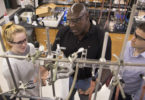Pancreatic cancer is one of the deadliest cancers, but work being conducted by a team of University of Georgia researchers aims to help physicians diagnose the disease early, when it’s more easily treated.
Funded by a $2.1 million grant from the National Institutes of Health, a team of UGA Cancer Center researchers is studying the fluid secreted by the pancreas to determine if subtle changes in proteins and the sugars that adorn the proteins, known as glycans, can herald the presence of cancerous or precancerous cells. The UGA effort is part of a $15.5 million, five-year NIH initiative to discover, develop and clinically validate new early diagnostic tests for cancer by studying glycans.
“There’s a lot of evidence that when cells become cancerous, they change their glycans,” said Michael Pierce, director of the UGA Cancer Center and principal investigator on the study. “We’re confident that we can find some of those changes in the ductal fluid and, once we’ve identified them, search for these biomarkers in the blood.”
Pierce said glycomics, the study of the kinds and amounts of glycans expressed by cells and the roles they play in cellular processes, is “the wave of the future” in cancer diagnostics. Glycans are remarkably complicated, however, and are found in hundreds of different arrangements – connected to each other like beads on a necklace, branching out like the roots of a tree, but somewhat flexible like a coiled phone cord.
The University’s Complex Carbohydrate Research Center is one of the few comprehensive facilities in the world equipped to study the role of glycans in human health. In 2003, it received a $6.2 million grant from the NIH to become a designated Resource Center for Biomedical Glycomics.
Pierce points out that the use of glycomics to help diagnose cancer is still a new field, but has already led to the 2006 approval by the FDA of an early diagnostic test for hepatocellular carcinoma (also known as primary liver cancer) that was developed by a Japanese pharmaceutical company. Several lines of evidence suggest that there are glycan and glycoprotein (proteins with attached glycans) biomarkers for many other cancers, including pancreatic cancer. Pierce said that if the markers are in pancreatic fluid, he and his team will find them.
“One of the reasons pancreatic cancer is so deadly is because there isn’t an early diagnostic test,” Pierce said. “We hope to change that.”








